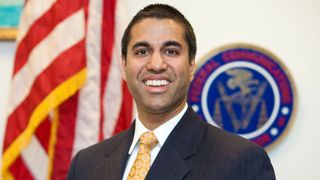Pai Dials Up Cross-Border SHAKEN/STIR First

FCC chair Ajit Pai and his Canadian counterpart, Ian Scott, chair of the Canadian Radio-Television and Telecommunications Commission a bit of a telecom version of the golden spike, completing the first cross-border call using the SHAKEN/STIR caller ID system meant to weed out unwanted robocalls.
Related: Pai Warns of SHAKEN/STIR Mandate
The call apparently went through, so neither party was trying to spoof the other. The call was between Comcast and the TELUS networks.
"[W]e conducted the first official cross-border call using SHAKEN/STIR," they said in a joint statement. "This new framework enables service providers to authenticate and verify the caller ID information of voice calls made using Internet Protocol. It’s essentially a digital fingerprint for telephone calls. When a call between participating providers is transmitted without that digital fingerprint, the receiving phone company will know that the caller ID information is spoofed and can act to protect its customer from scams."
In announcing his half or the "historic" call, Pai renewed his "demand" that voice service providers implement the SHAKEN/STIR authentication framework, which is currently voluntary, by the end of this month. He has teed up a Notice of Proposed Rulemaking for early next year mandating SHAKEN/STIR if that deadline is not met.
Related: FCC Confirms Default Robocall Blocking by Carriers
Pai has pointed out that all 50 state attorneys general signed a pact with a dozen telecoms with SHAKEN/STIR at the heart of that agreement.
Broadcasting & Cable Newsletter
The smarter way to stay on top of broadcasting and cable industry. Sign up below
Signing on to that pledge were Comcast, Charter, AT&T, Bandwidth, CenturyLink, Consolidated, Frontier, Sprint, T-Mobile, US Cellular, Verizon, and Windstream.
That commitment notwithstanding, some cable ops have argued that a SHAKEN/STIR mandate is not necessary, telling the FCC in comments that "requiring a company to implement SHAKEN/STIR before it is economically and technologically feasible for that company will only lead to ineffective and inefficient actions."
Contributing editor John Eggerton has been an editor and/or writer on media regulation, legislation and policy for over four decades, including covering the FCC, FTC, Congress, the major media trade associations, and the federal courts. In addition to Multichannel News and Broadcasting + Cable, his work has appeared in Radio World, TV Technology, TV Fax, This Week in Consumer Electronics, Variety and the Encyclopedia Britannica.

